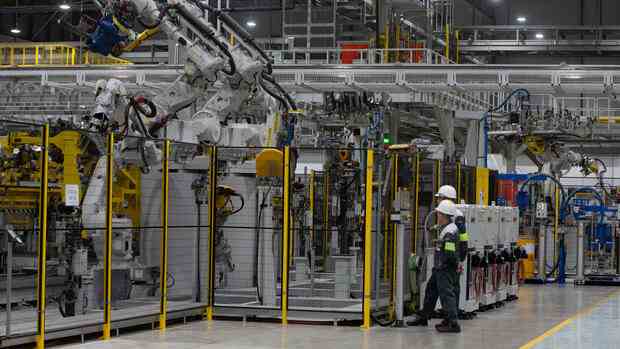Bangkok In an attempt to become more independent from China, the European Union is seeking proximity to the People’s Republic’s neighbors – and is relying on a special gesture: the EU heads of state and government have their counterparts from the Southeast Asian Asean countries for a joint summit this Wednesday invited to Brussels. It is the first meeting of this kind in the 45-year relationship between the two groups of states.
The potential for closer cooperation is great: the Asean countries, which include important emerging countries such as Indonesia, Thailand and Vietnam, are increasingly succeeding in establishing their industrial parks in the global supply chains as an alternative to the factories in China.
At the same time, the region is attracted by a growth market with almost 700 million inhabitants. According to forecasts, its economic output will increase by more than five percent this year – Southeast Asia is thus currently one of the fastest growing regions in the world.
In Brussels, people are convinced that a deepening of economic relations is in the interests of both parties – after all, Southeast Asia is also concerned about becoming too dependent on China and would like to position itself more broadly.
Top jobs of the day
Find the best jobs now and
be notified by email.
Nevertheless, attempts by the two economic blocs to move closer together are faltering. So far, the EU has only managed to conclude a free trade agreement with two of the ten Asean countries – Singapore and Vietnam.
Agreement with Indonesia possibly next year
Business representatives are now pushing to use the summit to give new impetus to negotiations with the other partners. “Europe has a lot of catching up to do,” says Chris Humphrey, head of the EU-Asean Business Council, which advocates for the interests of European companies in the region.
Humphrey called for the trade talks with Thailand, Malaysia and the Philippines, which had previously been put on hold, to be resumed quickly and for the ongoing negotiations with Indonesia to be concluded quickly.
The EU said on Tuesday that negotiations with Thailand, Malaysia and the Philippines would start “when the conditions are met”. Assurances are wanted from countries that, like the EU, they are interested in a comprehensive trade agreement.
With a view to the more than six years of negotiations with Indonesia, EU representatives announced that Commission President Ursula von der Leyen had spoken to Indonesian President Joko Widodo about a possible conclusion next year. “But we’re not there yet,” said Brussels.
So far, European business with the island state of around 275 million has been rather disappointing: the most populous country in the region ranks 17th among the world’s largest economies, but only ranks 31st in the list of the EU’s most important trading partners. Vietnam, whose economic output is significantly lower, exchanges twice the volume of goods with the EU.
Commission President Ursula von der Leyen is said to have spoken to Indonesian President Joko Widodo about a possible conclusion in the coming year.
(Photo: AP)
Disputes between the EU and the government in Jakarta include market access for Indonesian palm oil in Europe, which is associated with the deforestation of rainforests, and Indonesian export restrictions on raw materials.
>> Read here: The Remarkable Rise of Indonesia – Suddenly leaping into the top ten of the world economy
The EU lodged a complaint with the World Trade Organization against an export ban on nickel ore in Indonesia – and was right in a decision at the end of November. The government in Jakarta appealed on Monday.
Ban on sex outside of marriage sparks controversy
The talks with Indonesia, which will chair the Asean group next year, are also being burdened by a controversial new criminal law that casts doubt on a partnership in values with the majority Muslim country: the law passed by Parliament in Jakarta criminalizes extramarital sex – what especially homosexuals, as they are not allowed to marry in the country. In addition, bans on blasphemy will be expanded – which, according to human rights groups, will make criticism of Islam more difficult.
According to information from Brussels, the EU heads of state and government want to make the tightening of criminal law an issue in the talks with Widodo. Criminal law is also a cause for concern from the perspective of possible investments in Indonesia, it said. Foreigners might be deterred by the law.
The developments in Indonesia are examples of the dilemma the EU is facing in the region: on the one hand, Europe sees Southeast Asia as a strategic partner, on the other hand, the policies of the countries there are often in clear contradiction to the values of the EU – with authoritarian governments in countries like Cambodia and Vietnam, the dictator’s son Ferdinand Marcos jr. at the head of the Philippines and a military junta in Myanmar. However, their boss was not invited to Brussels.
The absence of the junta, which has close ties with China and Russia, should facilitate a joint final statement from the EU-Asean summit. There was a long struggle over the wording with regard to the Ukraine war and the conflicts in the South China Sea – especially with regard to Russia, the majority of the ASEAN countries see themselves as neutral.
>> Read here: What emerging market investors can learn from the example of Vietnam
However, EU representatives recently assumed that a clear statement by the two groups of states would be possible. The economic consequences of the war in the form of high energy and food prices are also being felt in Southeast Asia.
More: China’s rivals: seven charts show how the balance of power is shifting in Asia
